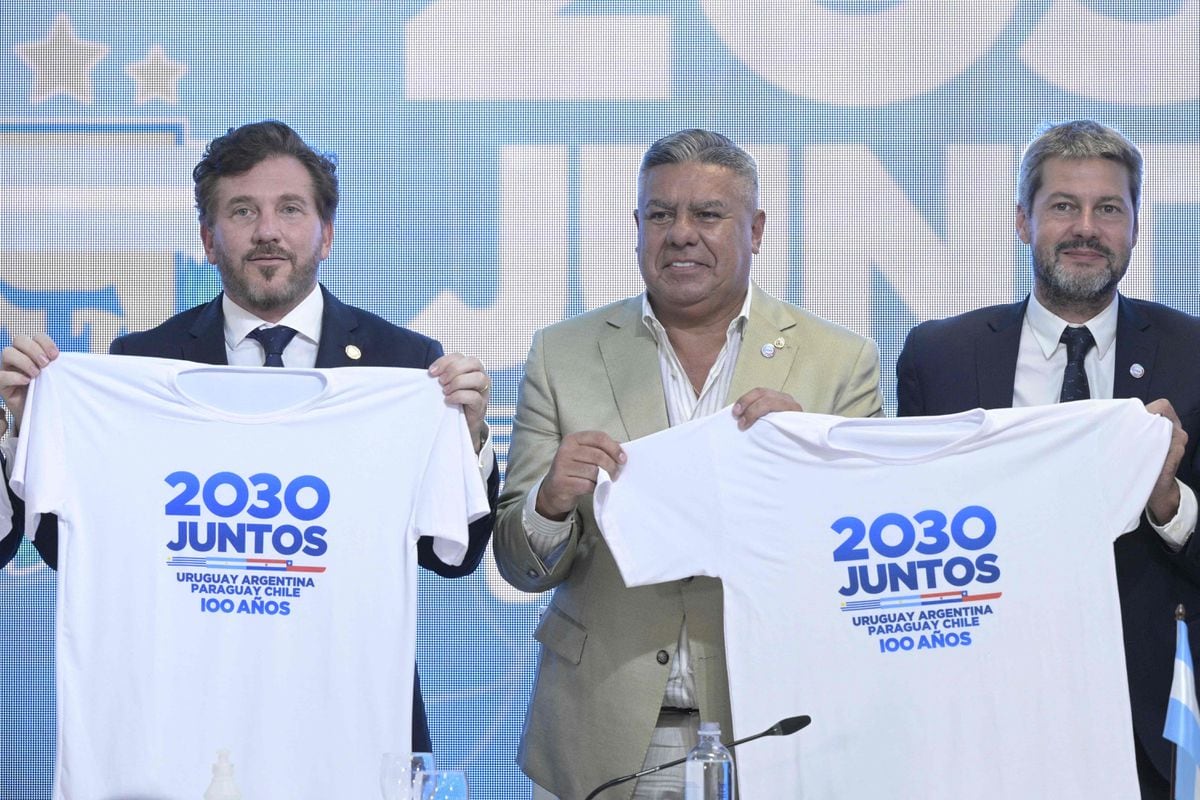The president of the South American Football Confederation, Alejandro Domínguez, the president of the Argentine Football Association, Claudio Tapia, and the Argentine Sports Minister, Matías Lammens, this Tuesday after the announcement in Buenos Aires.JUAN MABROMATA (AFP)
Argentina, Uruguay, Chile and Paraguay have presented this Tuesday in Buenos Aires their joint proposal to host the Soccer World Cup in 2030. The presidents of the federations of the four countries, who intend to celebrate the centenary of the first World Cup, held in Uruguay in 1930, have made the announcement accompanied by Alejandro Domínguez, the highest authority of the South American Football Confederation (Conmebol).
"FIFA has the obligation to honor the memory of those who made the first World Cup possible," said Domínguez, in an act in which optimism has not completely overshadowed the reality facing a South American candidacy: the turns and disagreements between governments and a connectivity between countries and infrastructure that must be renewed.
“The arguments we have to defend this candidacy are much more powerful than the materials.
We are not going to be able to compete in economic terms", has recognized the Minister of Tourism and Sports of Argentina, Matías Lammens, who has supported himself by remembering the weight of South American football: "Organizing this event is the first champion and the last".
The Uruguayan Sports Secretary, Sebastián Bauzá, has also chosen to be realistic: “We have to overcome barriers between governments, but football sometimes helps in that: in uniting peoples.
We have to work more and talk less.”
Conmebol is committed to this candidacy at a time of reconstruction of relations between the Mercosur countries, which make up Argentina, Uruguay and Paraguay together with Brazil.
The regional bloc has paralyzed its trade agreement with the European Union and Uruguay, led by the conservative Luis Lacalle Pou, disenchanted with the organization and negotiating an agreement alone with China.
The coming to power of the leftist Lula da Silva in Brazil may resolve part of the tension: just two weeks ago, he visited Lacalle Pou and promised to listen to his demands that the bloc modernize.
Lula also has a better image with European leaders than did his predecessor, Jair Bolsonaro, who seemed unwilling to listen to the EU's demands on ecology and climate change.
If that tension can be reduced,
The venue for the 2030 World Cup will be defined at the 74th FIFA Congress in 2024, two years before the World Cup to be organized by the United States, Mexico and Canada, which will be the first to organize the World Cup with a format that passes from 32 to 48 teams.
So far, the South American candidacy for 2030 has only one competitor, the joint bid by Spain, Portugal and Ukraine, who hope that the war in Russia will be over by then.
Saudi Arabia, according to some press reports, also intends to compete for the event.
He has not yet confirmed his intention, but his incursion would pose an interesting battle in Argentina: Lionel Messi, the captain of the last world champion, signed a multi-million dollar deal last year to be one of the main promoters of tourism in the Arab country.
Playing with the pitch inclined, Conmebol bets on the epic: at the meeting this Tuesday, references to the folklore of football in the region, the enthusiasm of its fans and the global footprint left by the players on this side of the Atlantic have abounded. like Diego Maradona and Lionel Messi.
The memory of the 1930 Soccer World Cup, which Uruguay organized with 15 other teams and a massive boycott of the European teams, also burned.
The small South American nation, which defeated Argentina in the final of that Cup, had just won the 1924 and 1928 Olympics, which FIFA then recognized as World Cups since it did not have its own tournament, and was celebrating the centenary of the oath of its first National Constitution.
The federations involved in the South American candidacy have not yet specified the distribution of venues, cities and stadiums in which the competition would be hosted.
The proposal is still under construction, as demonstrated by a tweet launched by the Argentine president, Alberto Fernández, inviting Bolivia to join the candidacy minutes before the event began.
“This candidacy is from the entire continent.
For this reason, I would like and I will propose that our sister country Bolivia be part of this dream, ”Fernández wrote, although his proposal was not echoed in the announcement made a few minutes later.
Some of the stadiums that could host the event, such as the Monumental in Buenos Aires or the Centenario in Montevideo, have been remodeled in recent years to modernize their facilities and expand public capacity.
The region has plenty of stadiums - only Buenos Aires and its suburbs have 36, with at least 10 that can hold up to 20,000 spectators - but connectivity between cities will be the biggest challenge.
The only history of Conmebol is not encouraging: since 2019, the South American confederation has wanted to emulate the European one in its competitions between clubs, eliminating the finals with two games and promoting one that is played in only one in a neutral city.
Between difficult-to-pay plane tickets and high ticket prices, only the first was played in a full stadium.
Subscribe here to the EL PAÍS America
newsletter
and receive all the latest news from the region

